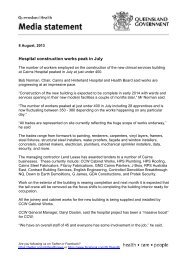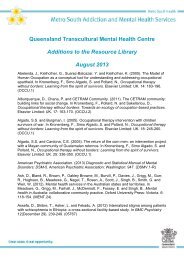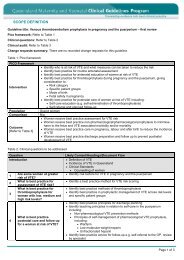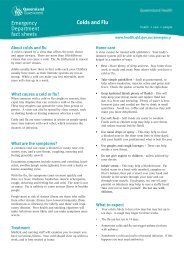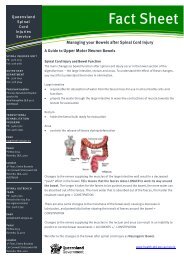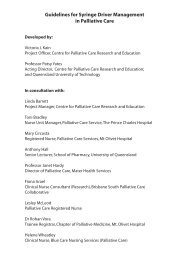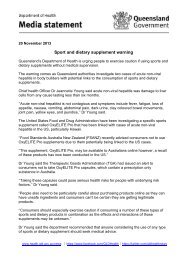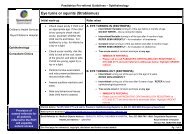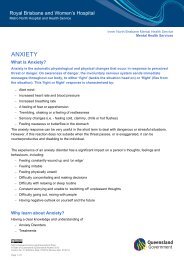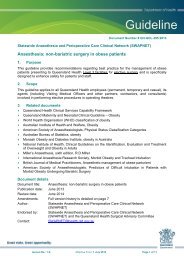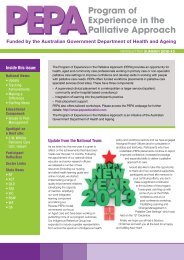Understanding Adynamia and Lack of Motivation - Queensland Health
Understanding Adynamia and Lack of Motivation - Queensland Health
Understanding Adynamia and Lack of Motivation - Queensland Health
You also want an ePaper? Increase the reach of your titles
YUMPU automatically turns print PDFs into web optimized ePapers that Google loves.
<strong>Underst<strong>and</strong>ing</strong> <strong>Adynamia</strong> <strong>and</strong> <strong>Lack</strong> <strong>of</strong> <strong>Motivation</strong><br />
<strong>Adynamia</strong> following brain<br />
injury is related to difficulties<br />
with ability to initiate or start<br />
activity, <strong>and</strong> to the ability to<br />
keep going to finish an<br />
activity or task.<br />
• After brain injury a person may show<br />
decreased or lost motivation <strong>and</strong> drive,<br />
<strong>and</strong> have difficulty planning <strong>and</strong> carrying<br />
out activities. They may experience loss<br />
<strong>of</strong> interest <strong>and</strong> enjoyment <strong>of</strong> previous<br />
enjoyed activities <strong>and</strong> interests.<br />
• <strong>Adynamia</strong> can cause greater difficulty<br />
with new or more complex activities or<br />
behaviours, particularly those with many<br />
steps, or where there is a sequence <strong>of</strong><br />
tasks.<br />
• Sometimes a person will be able to talk<br />
about plans, goals <strong>and</strong> activities that<br />
they want or need to do, but have<br />
difficulty starting or completing them.<br />
The person may know what to do, but<br />
may not do it.<br />
• Most people with adynamia will still be<br />
able to carry out many <strong>of</strong> their normal<br />
everyday activities, particularly if those<br />
tasks are easy, familiar, well-structured,<br />
or are routine or habitual activities.<br />
• In severe cases <strong>of</strong> adynamia, a person<br />
may be unable to perform basic self care<br />
activities such as showering, dressing,<br />
may not eat, or may not take care <strong>of</strong><br />
basic household tasks e.g. cleaning,<br />
taking medication, taking out the rubbish,<br />
paying bills, contacting friends or family.<br />
• People may think that the person with<br />
adynamia is lazy, lacking in motivation,<br />
or think they are not making an effort.<br />
<strong>Underst<strong>and</strong>ing</strong> these changes may be<br />
difficult for family <strong>and</strong> friends.<br />
Tips for Helping with <strong>Adynamia</strong><br />
Structure <strong>and</strong> Routine<br />
• An environment that is organised <strong>and</strong><br />
structured with regular daily routines <strong>and</strong><br />
activities is more likely to result in<br />
participation <strong>and</strong> completion <strong>of</strong> activities<br />
<strong>and</strong> tasks.<br />
• A person with mild difficulties may be<br />
able to independently use checklists,<br />
diaries <strong>and</strong> visual cues <strong>and</strong> prompts as a<br />
way to increase their independence.<br />
• If a person has more severe difficulties<br />
they may need more external support<br />
such as prompting <strong>and</strong> reminding along<br />
the way. Phone calls, texts, <strong>and</strong> emails<br />
can help keep things on track<br />
• Break down bigger tasks into smaller<br />
steps that are easier <strong>and</strong> quicker to<br />
achieve (see associated sheet on goal<br />
setting).<br />
• Structure <strong>and</strong> routine decrease dem<strong>and</strong><br />
on memory <strong>and</strong> thinking skills <strong>and</strong><br />
increases confidence, so:<br />
‣ Use checklists<br />
‣ Use plans<br />
‣ Use reminders<br />
‣ Use a diary, calendar or whiteboard<br />
(or all <strong>of</strong> the above)<br />
‣ Schedule activities <strong>and</strong> tasks<br />
©The State <strong>of</strong> Queensl<strong>and</strong> (Queensl<strong>and</strong> <strong>Health</strong>) 2011<br />
Acquired Brain Injury Outreach Service<br />
PO Box 6053 Bur<strong>and</strong>a 4102
Having Fun<br />
• A person will have more energy <strong>and</strong><br />
motivation for an activity if it is something<br />
they enjoy or would like to do.<br />
• Look for activities that are interesting <strong>and</strong><br />
worthwhile for the person in the local<br />
community. Check for easy access <strong>and</strong><br />
cost.<br />
• Explore previously enjoyed activities <strong>and</strong><br />
interests as well as new things. Look in<br />
the local area for new ideas e.g.<br />
newspapers, websites.<br />
• It is also important to know what<br />
activities a person didn’t enjoy prior to<br />
their injury. Expecting someone to do<br />
activities that they previously disliked or<br />
found difficult may be unrealistic.<br />
• To increase motivation <strong>and</strong> energy, build<br />
in plenty <strong>of</strong> rewards <strong>and</strong> pleasurable, fun<br />
activities. Put a less desirable activity or<br />
task, with something more interesting<br />
<strong>and</strong> enjoyable.<br />
• Keep photos <strong>and</strong> keepsakes to remind<br />
the person <strong>of</strong> activities they enjoyed, as<br />
this will help in maintaining interest <strong>and</strong><br />
motivation.<br />
Offer Choices<br />
Make suggestions <strong>and</strong> come up with<br />
ideas.<br />
• Be clear <strong>and</strong> consistent in the way<br />
activities or tasks are presented as an<br />
option. For everyday essential tasks <strong>and</strong><br />
activities give structured choices or<br />
options.<br />
For example, “Will you wash or wipe the dishes<br />
up?” or “Would you like to have a shower now, or<br />
in an hour?”<br />
• Either/or choices will work better than a<br />
choice <strong>of</strong> whether to do a single activity<br />
or not.<br />
• Encourage the person to participate in<br />
the decision making so they choose what<br />
they would like to get done or need to<br />
get done. Encourage them to choose<br />
<strong>and</strong> prioritise tasks.<br />
Social <strong>and</strong> Communication Skills<br />
A person may have difficulty starting<br />
conversations, or in keeping a<br />
conversation going.<br />
• Make a list <strong>of</strong> conversation topics e.g.<br />
sport, news, family which the person<br />
might enjoy.<br />
• Get to know the person <strong>and</strong> their<br />
interests, <strong>and</strong> introduce topics into the<br />
conversation e.g. cars, sport, music etc.<br />
• Try to ask open-ended questions, e.g.<br />
“what do you think about it”, rather than<br />
questions that can be answered with a<br />
“yes” or “no”, as this will tend to stop<br />
conversation.<br />
• Take time <strong>and</strong> listen.<br />
Encouraging <strong>Motivation</strong> <strong>and</strong> Activity<br />
• Use Contracting with the person.<br />
Contracts can be used to talk to the<br />
person about their goals, agreed<br />
activities, <strong>and</strong> timeframes.<br />
Contracts can include the what, when,<br />
where <strong>and</strong> who <strong>and</strong> how <strong>of</strong> planning:<br />
‣ What is to be done “You want to try out<br />
the fishing group”<br />
‣ When will it get done “I will pick you up<br />
on Tuesday at 9.00 <strong>and</strong> drive you there”<br />
‣ Who will do what “You will be dressed,<br />
<strong>and</strong> have your hat <strong>and</strong> bag <strong>and</strong> rod ready”<br />
‣ How will we know it is working “We<br />
will talk about it afterwards to see if it<br />
went well <strong>and</strong> you would like to do it<br />
again”.<br />
‣ What to do next<br />
• Be prepared to be flexible <strong>and</strong> try new<br />
ideas <strong>and</strong> activities. Get information<br />
about activities that will grab the person’s<br />
interest.<br />
• Have some energy <strong>and</strong> enthusiasm.<br />
The more positive you are, the more<br />
positive the person will be as well.<br />
Resources<br />
• See other Acquired Brain Injury Outreach<br />
Service (ABIOS) Information sheets at<br />
http://www.health.qld.gov.au/abios/<br />
©The State <strong>of</strong> Queensl<strong>and</strong> (Queensl<strong>and</strong> <strong>Health</strong>) 2011<br />
Acquired Brain Injury Outreach Service<br />
PO Box 6053 Bur<strong>and</strong>a 4102



